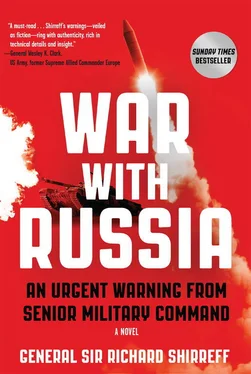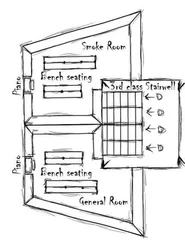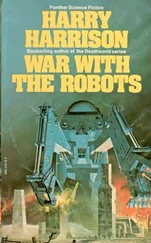“I am surprised, Mikhail Nikolayevich, that you dare face me and tell me that these ordinary infantry soldiers can attack your President with impunity and, a week later, you have failed to capture them.”
General Gareyev must have realized that he had overplayed his hand because his tone became conciliatory. “I agree, Vladimir Vladimirovich. It shall be so and this insult to you cannot stand. I’ll put Vronsky, the Spetsnaz major responsible for planning the demonstration in Riga, on the case. He knows the Baltic states and his network is strong. This British captain will be his top priority.”
The President nodded, apparently appeased for the moment.
Gareyev went on to explain that the demands of suppressing the eruption of guerrilla activity across the Baltic states was soaking up Russian military manpower and resources. With estimates of tens of thousands of men and women taking to the forest to fight the Russians as guerrillas—emulating the Forest Brothers’ campaigns of the 1950s in Estonia, Latvia and Lithuania—Russian generals were being forced to strip out manpower from other areas. Ukraine, the southern Caucasus and Crimea were being thinned out, but more were needed. Gareyev confronted the issue head on.
“If we are to crush this insurgency, I need every man I can get my hands on deployed across the Baltic states. Right now. These people are naturals at irregular warfare and unless I concentrate effort against them and crush them quickly, our hold on the three Baltic countries will be jeopardized. Every success just encourages them to think they can win, and pulls in more recruits…” Gareyev looked back at the President from the TV screen. “And you cannot afford for that to happen, Vladimir Vladimirovich.”
His meaning to Komarov and the underlying threat it carried was very clear: the President had to get this right or his position as leader would become vulnerable. Having led the Russians to war, his vision of incorporating the former Soviet republics of the Baltic states into the Russian Federation had to work. If it failed, then those who had supported him in order to see national pride restored would desert him for the unforgivable crime of destroying that very pride.
Komarov could see that the inference was not lost on the President.
“What are you proposing, Mikhail Nikolayevich?” he asked Gareyev.
“I need to thin out our garrison in Kaliningrad,” he said bluntly. “If we try to stay strong everywhere we will be strong nowhere. As I told you, we have thinned out in Ukraine, but I can only go so far. Any more and the ‘dubs’—dumb Ukrainian bastards—will be pushing our forces back and, if we suffer reverses there, that would be the ultimate humiliation. That said, the main threat comes from the Baltic states, so that is where the main effort should be. Kaliningrad is secure and I will leave sufficient forces there. The population is Russian and loyal, so that at least remains a secure base for us.”
“And NATO?” the President asked, as he did at every such briefing.
“No change. Any threat from NATO? Not a chance. First, it is still in disarray, so it will be unable to mount any credible threat against us. Second, even if they had the men, the Western Alliance would not dare undertake offensive operations against Russian soil.”
“To reinforce General Gerayev’s point, does NATO understand that if they ever try to attack Russian soil I will use nuclear weapons, Yevgeney Sergeyevich?” the President asked the Foreign Minister.
“Certainly they do. It has been made quite clear through diplomatic channels that you would not hesitate to use them in the event of either a NATO attack on the Baltic states, or any attack on Russian soil,” the Foreign Minister replied, with all the smoothness of a man used to dealing with diplomats.
Alongside him on the screen, the Deputy President and Director of FSB nodded in support.
“In fact,” the Foreign Minister continued, “just so we are clear, Vladimir Vladimirovich, it has been made known that Russia considers that the Baltic states are once again Russia.”
“Very well, Mikhail Nikolayevich. You may take the increased risk in Kaliningrad… but I want the insurrection in the Baltic states crushed within the month. Is that clear?”
“Very clear,” said Gareyev.
“And that British captain brought to me in Moscow.”
Komarov flicked the switch on the remote control and the screen went blank. The President sat silent, deep in thought. Here, Komarov could see, was a man who had thought he controlled events, but was now beginning to recognize that the dynamic he had started was not so easily controlled. Obviously, the propaganda war was not going as planned. The two NATO ships sunk in Riga and the US airmen slaughtered at Lielvārde had been written off as an unfortunate error—collateral damage. But the sinking of the Eckernförde had so enraged Germany that it looked as if it had jolted them out of their traditional pacifism. Not only were the Germans rediscovering their balls, they were now ready to implement the collective defense guarantee.
The unexpected consequence of these errors was that NATO had agreed Article 5, but that meant little on its own. Certainly, none of the Europeans, except for the British—still under the illusion that they were a serious international player, despite shedding power quicker than a whore dropping her knickers—had looked to be preparing for offensive action. But the President’s extraordinary humiliation at Ligatne had changed the whole dynamic and with it their plan.
Once Britain had signed up to Article 5, HMS Queen Elizabeth had become a legitimate target. However, there had been international TV crews and journalists on board and on nearby ships, some now dead. Footage had gone out to the world of the sudden and unexpected torpedo attack under a sunny blue sky; followed by the mass drownings recorded for posterity on film, with associated sounds. Westerners everywhere could imagine their sons and daughters aboard the stricken ship as it sank.
Now every NATO ship and every base everywhere in the world was on full alert against another Russian attack. Newspapers and TV shows were endlessly debating the legitimacy, or not, of the attack. People who had never even heard of NATO, let alone Article 5, were listening to rolling TV news and programs where experts discussed the importance of signing up for it. And all because the President had taken the Ligatne attack personally and ordered the sinking to get his own back on the British.
Cold, pragmatic self-interest would have left the ship afloat and tolerated the British playing their delusional war games with their undersized and underfunded armed forces. Before long the outrage of the West over the Baltics would have fizzled out and Russia would have been left free to deal with her rebellious Baltic peoples. Instead, a new British prime minister had taken over—a man, it seemed, very unlike his predecessor and with the stomach for battle. The House of Commons vote to implement Article 5 to fight for the Baltic states, which would almost certainly have been knife edge or rejected before the sinking, had passed with a massive majority.
Now even the most cynical foreign observers of the British scene were remarking at the return of the “Blitz” spirit of 1940. Even more unexpected had been the reaction of hitherto pacifist Germany, where the Bundestag and Constitutional Court had been almost bellicose in their support for Article 5. Meanwhile, it looked as if America under its new president, despite its much-heralded Asia–Pacific pivot, might be about to refocus on Europe and resume its infernal interference with European defense. This was despite the President’s clever move in repatriating the American bodies and prisoners taken at Lielvārde air base in Latvia with due ceremony, in an effort to make some sort of amends, and try and draw a line under the matter. In Moscow and St. Petersburg, word had it that the intelligentsia, hitherto uncritical supporters of the President, were whispering—very quietly—that all this had come about because the President had lost his temper and become a laughing stock.
Читать дальше












